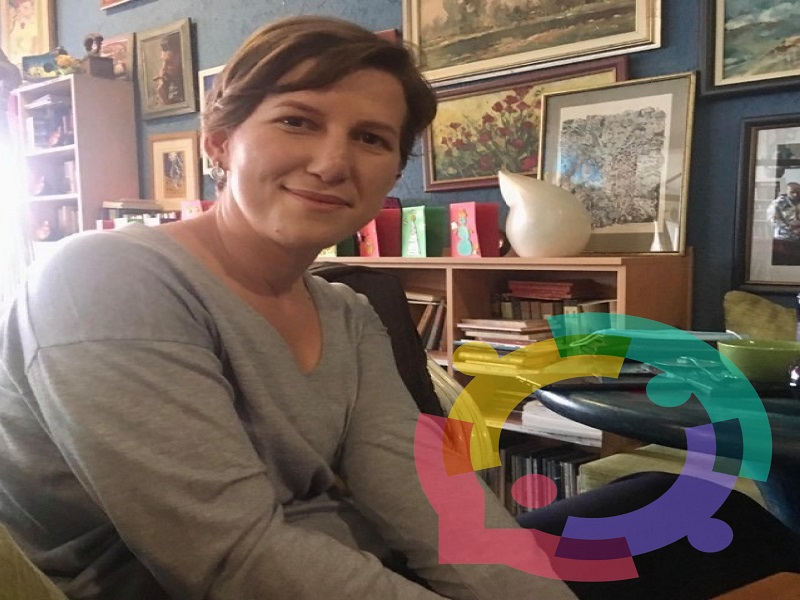Category: Blog Organizations: Alternativna , UNMIK Tags:
The moon that breathes in, something that opens, flickers, that is the translation of the Turkish name Shenaj. Shenaj Belegu is a 30-year-old woman, a carrier of this moon that opens the horizons of human souls.
She is known as a translator and is employed as a researcher at the Centre for Humanitarian Law in Pristina, where she lives with her family. She was born in Mitrovica. Until she was 10 years old, she was living in the northern part, after the war - in the south, and after she started a family and became a mother, of now three-year-old Hana, went to Prishtina.
Life in different realms enabled her, as she explains, to learn all local languages, to meet different people and the dynamics of their lives, and in this she sees the benefits of the work she does.
"At home, I only speak Turkish with my mom and also Serbian when I need to. Through the languages, I meet the background, the soul of every person, what he meant. I can read between the lines and adjust it to be understandable for other people, not just translate it literally," she noted, adding that she personally prefers to translate poetry, Rumi primarily.
Translates it from Faroe, that is, Persian first to English, then Albanian, and that's something she does for her soul.
The loveliness of her nature is an expression of honesty and nobility with which she wants to paint every day of hers.
In addition to the work she does, Shenaj likes to help people and cook exclusive courses according to her recipe. Healthy, green, spiced with lots of love. On her Instagram profile, she posts recipes of the food she cooks herself and shares with friends.
Tastes are not standardly discussed, but Shenaj tastes to guess how she can make others happy. For several years, she visits, helps, and cooks at a nursing home in Pristina and says that only then does she feel like she is doing what she really loves.
Daily in her translation work, she is confronted with different texts, but admits that she does not like to translate political texts, which are too 'sterile':
"Political texts are very technical, and any text that doesn't carry a message with it is not difficult, but it is artificial."
On literacy grammar, spelling and general curiosity of young people, Shenaj believes that it should be everyone’s obligation, as something that needs and must be nurtured.
Responsibility when it comes to language should be thought by everyone, and our interlocutor points out that language can bring people together if its learn where it needs to be and where unfortunately there is none.
"I am sorry that at the Faculty of Philology in Pristina they do not have a Department of Serbian Language, while in Belgrade there are departments of albanology, and I know extraordinary students who know a lot, read a lot," Shenaj revealed, reminding that there are courses, now virtual, that all communities are interested in, and this gives hope that people become aware of the importance of language knowledge in multicultural environments.
That we lack kind words about each other Shenajs is not questioned and firmly argues that everyone must look back on what they carry inside, and then take it out of themselves.
"I disagree with the fact that we should face the past, this is a new statement that has become a post-war trend. We should be calm with ourselves, then with our environment," Shenaj explicitly said, and is convinced that any reconciliation can only occur if we empathize with each other.
"We all have the same problems, the same obstacles, the same life, but we live divided, and we lack only a little empathy, we need to meet our fellow citizens, friends, neighbours," she reminded, referring to quotas in the assembly where, for example, the number of women is important, not the quality of human relations, which she rates as artificial.
It is natural, she said, that people are not under some kind of supervision, but rather to freely carry out their most natural needs and cites a market in the northern part of Mitrovica, where Albanians and Serbs trade freely.
It is freedom to be yourself and to know yourself, your identity, and then the identities of others, which she says is the most important when you are in the translation business.
"It's important to get to know the culture, the identity of these people, and translation doesn't require some extreme skills, it's a craft that you learn and where you can thrive if you work," Shenaj said.
When asked which word comes to mind first, and to sound the same in Both Serbian and Albanian, shereplies that it is pepper-spice.
When Shenaj ’spices’ with the skill of her translation, then surely there are no words that won't inflame the thinnest human senses and feelings with her taste. She really opens closed souls.
It doesn't ‘translate’ thirsty across the water, but knowing how she likes it, gives mercy, because under the sky nothing can be hidden, it just does good, so you'll be fine.




